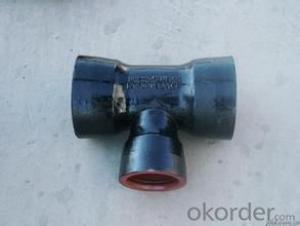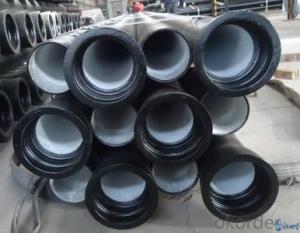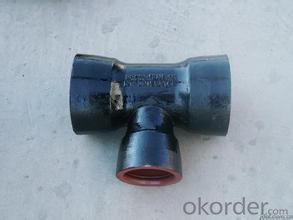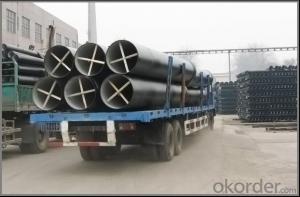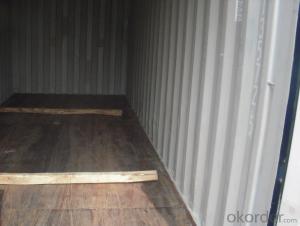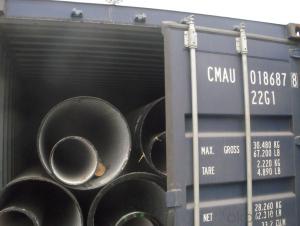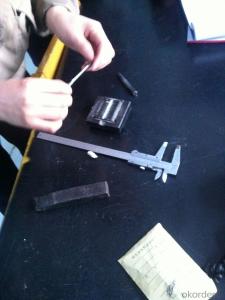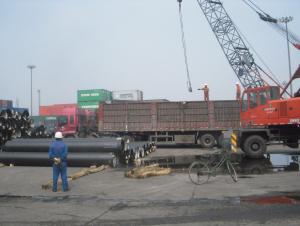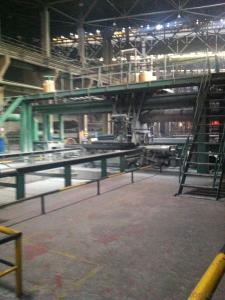DUCTILE IRON PIPE AND PIPE FITTINGS K8 CLASS DN350
- Loading Port:
- Tianjin
- Payment Terms:
- TT OR LC
- Min Order Qty:
- 23 pc
- Supply Capability:
- 3000 pc/month
OKorder Service Pledge
OKorder Financial Service
You Might Also Like
Material : Ductile Cast Iron
Size Range : DN 80mm to DN 2000mm
Unit Effective Length : 6m or 5.7m
Manufacture Standard: ISO 2531:1998/ EN 545:2006/EN 598:2007
Annual capacity : 200,000 tons
Coating Exterior: Zinc 130g/m2 according to ISO 8179-1 and bitumen coating 70 microns.
Cement Interior: Portland Cement/ High Alumina Cement/ Sulphate Resisting Cement Lining according to ISO 4179
Special requirements on external coating and internal lining can be applied
We also provide accessories such as SBR/EPDM rubber gaskets, lubricant paste, pipe caps, PE sleeves, etc.
Additional Parts:
Each pipe is strictly inspected according to related standard to ensure permanently high performance.
Easy Installation at site and service free for life
Long Service Lifespan
Quotation will arrive you within 24hours once we get your inquiry.
We guarantee offering you a competitive price.
A copy of original inspection reports of pipes will be offered after shipment.
Photos of loading process will be sent to the customer after shipment effect.
We will follow-up the delivery progress after shipment effect and update to the customer on weekly basis.
- Q: What are the typical applications for ductile iron pipes?
- Ductile iron pipes are commonly used in various applications due to their unique properties and advantages. Some of the typical applications for ductile iron pipes include: 1. Water Supply Systems: Ductile iron pipes are extensively used in water supply systems, including municipal water distribution networks, as they provide excellent resistance against corrosion and have high durability. They can withstand high pressure and offer long service life, making them ideal for transporting potable water. 2. Wastewater and Sewage Systems: Ductile iron pipes are also widely utilized in wastewater and sewage systems. They can handle the transportation of sewage and other wastewater effectively due to their strength and resistance to chemical corrosion. These pipes are commonly used in underground sewer lines, sewer force mains, and wastewater treatment plants. 3. Industrial Applications: Ductile iron pipes find applications in various industrial sectors. They are commonly used for transporting different types of fluids, such as chemicals, slurries, and abrasive substances. Their strength, toughness, and resistance to external loads make them suitable for industrial pipelines, including those in power plants, refineries, and mining operations. 4. Irrigation Systems: Ductile iron pipes are frequently employed in irrigation systems for agriculture, landscaping, and golf courses. These pipes can withstand high water pressure and provide a reliable solution for transporting water over long distances. Their corrosion resistance ensures water quality is maintained, and their durability reduces the need for frequent maintenance. 5. Fire Protection Systems: Ductile iron pipes are widely used in fire protection systems, including sprinkler systems and fire hydrants. Their strength and ability to withstand high pressure make them suitable for delivering water rapidly in case of fire emergencies. These pipes are also resistant to heat, making them a reliable choice for fire protection applications. In summary, ductile iron pipes are versatile and widely used in various applications, including water supply systems, wastewater and sewage systems, industrial pipelines, irrigation systems, and fire protection systems. Their durability, corrosion resistance, and ability to withstand high pressure make them a preferred choice for these applications.
- Q: Fire water supply network adopts ductile iron pipe, the test pressure should be no more than MPa
- Strictly speaking: the outer pipe network and the internal pipe network are the same. Minimum fire 1.0MPa, minimum sprinkler 1.4MPa. Because not only in accordance with the water pump, but also take into account the pressure on the fire engine.
- Q: Can ductile iron pipes be used for trenchless installation methods?
- Yes, ductile iron pipes can be used for trenchless installation methods. Trenchless installation methods, such as horizontal directional drilling or pipe bursting, allow for the installation of pipes without the need for extensive excavation. Ductile iron pipes are known for their strength, durability, and flexibility, making them suitable for these trenchless methods. Additionally, ductile iron pipes have excellent resistance to corrosion and can withstand high-pressure conditions, further enhancing their suitability for trenchless installation.
- Q: Can ductile iron pipe be used for industrial process piping?
- Indeed, industrial process piping can make use of ductile iron pipe. Renowned for its robustness, longevity, and ability to withstand corrosion, ductile iron pipe proves itself as an appropriate selection for diverse industrial functions. It boasts the capability to manage high-pressure systems and commonly finds application in sectors like water and wastewater treatment, oil and gas, chemical processing, and power generation. Moreover, ductile iron pipe offers ease of installation and an extensive lifespan, thus rendering it a cost-efficient choice for industrial process piping.
- Q: Can ductile iron pipes be recycled?
- Yes, ductile iron pipes can be recycled. Ductile iron is a highly recyclable material, and the pipes can be melted down and reused in various applications, reducing the need for raw materials and promoting a more sustainable approach to infrastructure development.
- Q: How long is the service life of the cast iron pipe, and the time of use of ductile iron pipes?
- When it comes to the service life of nodular cast iron, its maintenance is essential for its long service life. Then, the focus of the maintenance of ductile iron pipe is to pay special attention to, will affect the long-term use of ductile iron pipes, stable operation of socket, row, etc., we should make efforts to these aspects of the mouth without debris. Make sure that the rubber ring of the ductile iron pipe has been smashed with a rubber hammer, and it is not twisted or twisted, and it is uniformly stuck in the slot. Ductile iron pipe in the maintenance process, because of the pneumatic tube axis is buried into the ground, so in the face of a tilt angle of the time, we must be careful, if the resistance is too large, will not force the excavation, in order to prevent the distortion of the rubber ring.
- Q: What is the typical weight of ductile iron pipe?
- The typical weight of ductile iron pipe varies depending on the diameter and wall thickness, but it typically ranges from 10 to 64 pounds per linear foot.
- Q: Can ductile iron pipes be made of flexible waterproof sleeves?
- The casing can be divided into ordinary casing to be 2-4 cm thick than the pipe to be used and fixed to the wall or plate, and the pipe passes through it. Flexible bushing - between the casing and pipe, with flexible material to seal the sealing effect. Rigid casing - that is, between the casing and pipe with rigid material sealed to achieve sealing effect. Waterproof casing - is the use of the casing of the environment is to prevent liquid leakage or leakage into place (such as the pool, septic tanks, basement, etc.) is on the outer wall of the bushing is not less than 1 times increase waterproof wing, this wall is poured in the casing as a whole, not because of swelling shrinkage factor and crack and leakage.
- Q: What are the differences between cast iron pipes W and A?
- W cast iron pipe is subdivided into W cast iron pipe and W1 cast iron pipe, the difference between them is the difference between the wall thickness. Because of the cold weather, the requirements for pipes are higher. The W cast iron pipes are mainly used in the north, while the W1 cast iron pipes are mainly used in the south.
- Q: Are ductile iron pipes suitable for use in wastewater treatment plants?
- Yes, ductile iron pipes are suitable for use in wastewater treatment plants. Ductile iron has excellent corrosion resistance, high strength, and durability, making it ideal for handling the harsh and corrosive environment found in wastewater treatment plants. Additionally, ductile iron pipes have a long lifespan and can withstand the high-pressure demands of wastewater systems, making them a reliable choice for this application.
Send your message to us
DUCTILE IRON PIPE AND PIPE FITTINGS K8 CLASS DN350
- Loading Port:
- Tianjin
- Payment Terms:
- TT OR LC
- Min Order Qty:
- 23 pc
- Supply Capability:
- 3000 pc/month
OKorder Service Pledge
OKorder Financial Service
Similar products
Hot products
Hot Searches
Related keywords
